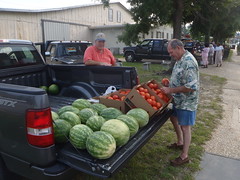For many years big agro has treated the world’s health as an economic externality, a problem for somebody else that did not affect its own bottom line. That is starting to change, most recently in Argentina.
Anthony Gucciardi wrote for NaturalSociety 11 April 2012, Explosive: Monsanto ‘Knowingly Poisoned Workers’ Causing Devastating Birth Defects,
In a developing news piece just unleashed by acourthouse news wire, Monsanto is being brought to court by dozens of Argentinean tobacco farmers who say that the biotech giant knowingly poisoned them with herbicides and pesticides and subsequently caused ”devastating birth defects” in their children. The farmers are now suing not only Monsanto on behalf of their children, but many big tobacco giants as well. The birth defects that the farmers say occurred as a result are many, and include cerebral palsy, down syndrome, psychomotor retardation, missing fingers, and blindness.
 This would be the same Monsanto that was convicted of chemical poisoning in France.
This would be the same Monsanto that was convicted of chemical poisoning in France.
But this is once again far away in a small country of which we know nothing, right? Wrong:
The farmers come from small family-owned farms in Misiones Province and sell their tobacco to many United States distributors. The family farmers say that major tobacco companies like the Philip Morris company asked them to use Monsanto’s herbicides and pesticides, assuring them that the products were safe. Through asserting that the toxic chemicals were safe, the farmers state in their claim that the tobacco companies ”wrongfully caused the parental and infant plaintiffs to be exposed to those chemicals and substances which they both knew, or should have known, would cause the infant offspring of the parental plaintiffs to be born with devastating birth defects.”
Still, it must be some obscure poison only sold in the third world, right?
Wrong:
The majority of the farmers in the area used Monsanto’s Roundup, an herbicide with the active ingredient glyphosate that has shown to be killing human kidney cells. What’s more, the farmers say that the tobacco companies pushed Monsanto’s Roundup on the farmers despite a lack of protective equipment. In other words, these farmers — many in dire economic conditions — were being directly exposed to Roundup in large concentrations without any protective gear (or even experience or skills in handling the substance). Still, the farmers say the tobacco giants required the struggling farmers to ‘purchase excessive quantities of Roundup and other pesticides’.
That would be the same Roundup that farmers use around here all the time, without protective equipment. The Roundup we already knew was toxic to humans, as is the Roundup-ready corn it’s sprayed on. And 90+% of corn, soybeans, peanuts, and cotton grown in Georgia are Roundup-Ready. You’re not a farmer, so you don’t care? What about spray drift, such as from the cotton field across the street from Sallas-Mahone Elementary in Valdosta? What about glysophate, the active ingredient of Roundup, found in every sample of urine, many times the limit for drinking water? What about prenatal exposure to pesticides proven to lower IQ? And pesticides in children’s urine linked to ADHD? Maybe you think you’re invulnerable to poison, but what about your children, born and unborn?

And the lawsuit was filed not in Argentina, but in New Castle County Court, Delaware.
Maybe you live in some country far away from all that. Like Germany, which grows no GMO crops and uses no Monsanto pesticides. Sorry, many foods in your supermarkets are contaminated anyway.
And it’s not just in the food:
Most shocking, the farmers were ordered to discard leftover herbicides and pesticides in locations in which they leached directly into the water supply. With Monsanto’s Roundup already known to be contaminating the groundwater, this comes as a serious threat to pure water supplies.
That could never happen around here, right? Farmers surely must be more careful with pesticides than that? The same farmers who apply those pesticides while wearing no protective equipment. Who let them drift onto elementary schools. Whose fields drain into streams that run into our rivers. Who don’t even get the profits from applying poison: they owe it all to the seed companies which are mostly owned by the pesticide purveyors, and to the banks. Farmers will benefit more than anybody else by ditching the greedy poison manufacturers.
How did all this happen?
The farmers end their landmark case with an explanation as to why the tobacco companies allowed Monsanto’s herbicides and pesticides to be unloaded on the small family farms in such vast quantities and purchased in excessive amounts. In their claim, the farmers state that the tobacco companies were ”motivated by a desire for unwarranted economic gain and profit,” with zero regard for the farmers and their infant children — many of which are now suffering from severe birth defects from Monsanto’s products.
 As Gordon Gekko put it in the 1987 film Wall Street:
As Gordon Gekko put it in the 1987 film Wall Street:
The richest one percent of this country owns half the country’s wealth . . . You’ve got ninety percent of the American public out there with little or no net worth. I create nothing; I own.
Even that wasn’t enough. Some companies have gotten up to poisoning the world’s food supply for their private profit. How will this change? When the rest of us explain to those few hundred companies and families that there is no such thing as an economic externality in a world as interconnected as ours is becoming. Farmers in France and Argentina have started explaining that to Monsanto in the courts. We can do the same right here at home.

And we can vote at the checkout counter: even mighty ConAgra listens to that.
We can grow our own food or buy from those who do.Even mighty Monsanto won’t last forever. Two words for why: “mutant pigweed”. Add to that lawsuits and educated customers, and we can grow a healthy food supply.
-jsq
Short Link: